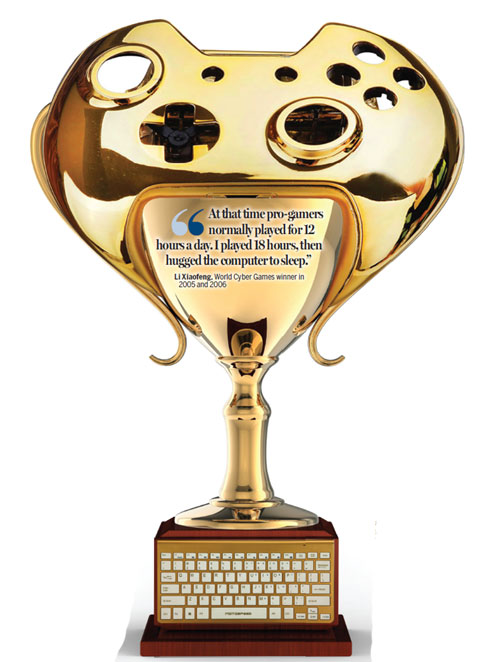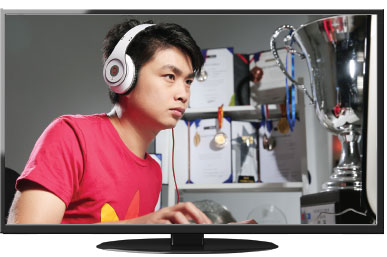Stardom, with a flick of the wrist
Updated: 2016-01-28 08:42
By Evelyn Yu(HK Edition)
|
|||||||||
Video gaming now attracts massive online following and big-time corporate sponsorship. Evelyn Yu reports.
Video gaming is more than just a big business. It's become an international spectator sport where young players can earn big money.
It was down to the finals, and online 32 million people were glued to their computers to see who would be the winner in Season 3 of the wildly popular online game, League of Legend (LOL)'s World Championship series. The online game had already swept Hong Kong, the Chinese mainland, Macao and Taiwan.
If you don't believe the numbers are impressive, note that they were in a range to double the average 17.7 million viewers tuned in to the National Basketball Association (NBA) finals in 2013.
There is a clear distinction between ordinary video games and what has come to be called eSport. In both cases, players are seated in front of computers, manipulating objects on a screen, but eSport is capable of drawing mass online audiences and gamers can make big money.
To give a clearer picture, LOL has 67 million players, according to the official website - more than the population of France.
Obviously online gaming as a form of spectator entertainment has become big business. Dota 2, another popular online game, boasted a prize pool of $18 million at its championship tournament in 2015. The final was held at Seattle's Key Arena. Overseas players coming to the United States were granted visas as professional athletes.
Derek Cheung, CEO of Hong Kong Esports, a leading company of its kind in the city, has a stable of over 30 players, aged 17 to 25. He claims his top players earn as much as HK$ 200,000 per month.
Top players, in their early twenties or even younger, once stigmatized as indolent, socially inept nerds, are earning big dollars and even fame, riding high on the industry's ballooning success.
Cheung said the seemingly spectacular incomes of some of his players are small stuff compared with what players in the US and Europe are earning. SuperData Research, a New York firm that tracks eSport, estimated that the industry generated more than $600 million in global revenue in 2015, from ticket and merchandise sales, corporate sponsorships and advertising.
Cheung's company has corporate sponsorship, which he says is critical to keep the business afloat. He declined, however, to say how much corporate sponsorship he got.
Since he started Hong Kong Esports in 2014, the company has clocked 4 million views per month on its official website alone. Nowadays popular players earn tens of thousands of dollars by appearing in Twitch, a live streaming platform, and YouTube advertisements besides streaming video of themselves playing videogames.
More than a third of the 30 plus gamers in Cheung's company are youngsters from Hong Kong. On a field trip to their "training" base in Taiwan, gamers would sleep in till 10 am, then spend the day on morning exercise, strategic meetings, engaging in group play and individual practice. A coach and three analysts would watch they play carefully, offering advice on ways to improve performance. Players train at least nine hours a day, in preparation for the world final. Only two or three teams from the Hong Kong/Macao/Taiwan region can qualify for the big event.
With support from eSport companies around the world and syndicate sponsors, millions of amateurs are hard at play, hoping they will become good enough to be signed up as professionals.
A serious game
Li Xiaofeng, better known as "Sky", who played Blizzard Entertainment's real-time strategy game Warcraft III: The Frozen Throne, was dubbed "King of Human" and became legendary when he took first at the World Cyber Games in both 2005 and 2006. He remained a top player in Warcraft and made around HK$1 million a year, before retiring last year.
Li comes from Ruzhou, Henan province, where his father is a doctor. His mother has retired from a winery. Li used to suffer from low self-esteem, considering himself an underachiever, poor, not handsome, and if that wasn't enough to dent his self-image, he was bullied by other kids.
In eSport competition, Li became another person, known for his aggressive playing style, rapidly researching in-game technology, building militia, siege towers and summoning creatures swiftly to overwhelm his opponent. On a screen overrun with text, graphics, scores, game map and more, Li could execute over 250 operations in a single minute from his keyboard. He became recognized as the greatest Warcraft III player in the game's history.
"At that time pro-gamers normally played for 12 hours a day. I played 18 hours, then hugged the computer to sleep," Li recalled of his early days.
In high school, he used his breakfast stipend for game currency, stole money from his dad and pawned valuable items from home, so he could keep playing. He would travel to regional matches, in the hope of representing China in the world finals. For all this, he earned frequent beatings from his father, who was disappointed and alarmed at his son's video games addiction.
Still, Li pressed on. "I enjoy the achievement in the game when I win, it's not just for fun. It's competition," he said.
Star player
Young players at Cheung's company don't have to endure such hardships. Dinter Xue Hong-wei, a 25-year-old from Taiwan, plays Jungle, a support role in Cheung's LOL team at Hong Kong Esports. He was a cameraman before he got signed by eSports agencies, and now he feels like a celebrity, not just a computer gamer.
Besides training, he attends promotional events on behalf of sponsors. He also appears in advertising videos. Xue said he had been swarmed by diehard fans who wanted his autograph or just to give him a hug.
Stardom for gamers can be short-lived and it comes at some cost. Hong Kong LOL gamer Kurtis Lau Wai-kin, also known as "Toyz" was the first and only Hong Kong player to win first place in LOL's world championship. As a member of the Taiwan-based Taipei Assassins, he won the Season 2 Championship in 2012. In June 2013 he was forced to retire after developing carpal tunnel syndrome, a painful wrist injury. After a long break, the former champion became captain at Hong Kong Esports.
Reflexes start to dull with age in a highly competitive environment that requires a gamer to press the keyboard or mouse several times a second. A player at 25 might already be "old" in the world of online gaming. Professional careers in eSport normally last only two or three years. Cheung said he tries to avoid recruiting high school students, considering that if they quit school early, they might find themselves unemployable when they retire and hit the job market.
Game designers are adapting and hoping to keep professionals in the game longer by emphasizing strategy and team play over repetitive rapid hand and wrist movement. After retirement, many players move on to become coaches or analysts.
Li started his own company Taidu, producing gaming equipment after he retired. The company sells computer mice designed specifically for Chinese players.
Cheung sees his young players as strong, self-centered personalities. Feuds among team members are frequent, and may blow up over differences in game strategy or even trivial day to day issues.
Late last year, Lau was given the boot from the Taiwan training base. The company told China Daily that its star player was "unwilling to cooperate" and threatened to quit for several times. As a warning, the company sent him back to Hong Kong. Lau posted on Facebook that he would leave Hong Kong Esports. The post also included a coded message accusing Cheung of "forcing" him to lose.
The social network buzzed. Riot Games, the developer behind LOL, fined Esports NT$200,000 ($5,950) for breaching rules of fairness.
Hong Kong Esports failed to make it to the world final this year. Xue thinks he might go back to being a cameraman if one day he retires. But he still "loves" his current job. He is drawn by the possibility of achievement in the cyber world, such an achievement, as he said, normally wouldn't have been made in the real world.
Contact the writer at evelyn@chinadailyhk.com


|
Thousands of spectators, many of them diehard fans, gathered to watch players of Hong Kong Esports competing in the game. Photos Provided To China Daily |
|
Sky Li Xiaofeng just retired, ending a 10-year-long professional gamer career. He is now an entrepreneur selling gaming equipment designed for Chinese players. |
(HK Edition 01/28/2016 page10)

